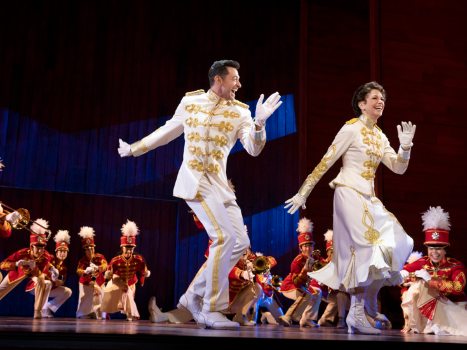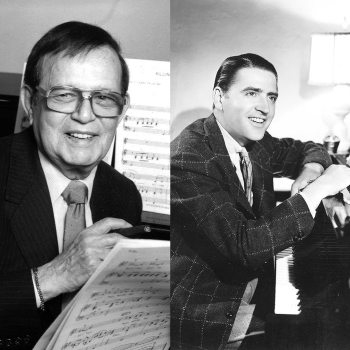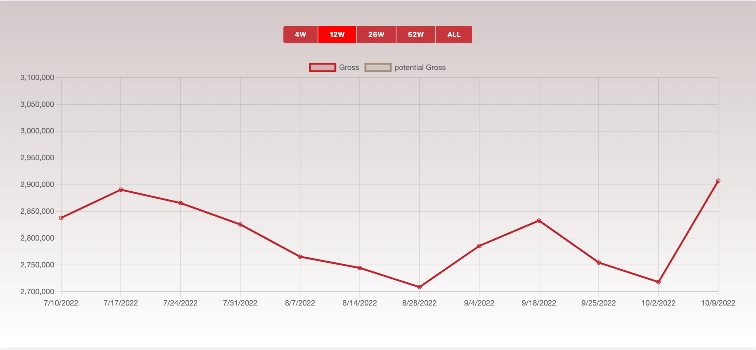
Back when I interviewed Jonathan Bank from the Mint Theater Company, I promised there was a post to come about the closing of the latest Broadway revival of The Music Man, which seemed to send shock waves around the theatre community. As I approach midterms this week and next in graduate school, and didn’t have an interview spot scheduled for a little bit, I decided to take the opportunity for a closer look.
It’s natural I, and many others like me, would be interested in this production of The Music Man. As I’ve long professed on this platform, I’m a lover of the Golden Age musical, for better or for worse. I grew up listening to The Music Man original cast album, and I remember the dismay I felt when I learned that Meredith Willson was not, in fact, a woman (boy was I in for a treat in learning about the involvement, or lack thereof, of women in the theatre…”wait, so Jule Styne is also a guy?!”).

Regardless, I loved the show, and I came to see it as one of the talismans of Broadway’s Golden Age, a time of sumptuous scores, witty lyrics, interesting librettos, side-splitting comedy, and glorious romance. One of the reasons I found this production in particular interesting, from the moment I first heard about it back in 2019 or even 2018, was because it offered an interesting case study for my academic research.
It’s no secret that many people have come to see Golden Age musicals as “problematic,” to put it lightly. Even esteemed former theatre critic for The NY Times, Frank Rich, referred to it as “the site of sex, violence…and imperialism.” The scholarly community has been even less kind. In the introduction to his book, The Great White Way: Race and the Broadway Musical, Warren Hoffman wrote that so-called “Golden Age” musical theatre “promulgate[s]…white privilege and white racial favoritism…advocate[s] for a return to white America” and “uphold[s] white supremacy.” In the new anthology Troubling Traditions, composer Georgia Stitt wrote that the canon not only fails people of color, but also women: “it’s rare to find a [Golden Age] musical that passes the Bechdel Test,” she said. “Women…[are] ingenues, brides, prostitutes, whores, crones, [or] comedic sidekicks.” Brandon Webster perhaps summarized this line of thinking best when he said, “US musical theatre has been crippled by a deep Racism, Misogyny, and Xenophobia, while loudly boasting a mediocrity that is fundamentally and uniquely American.”
In my research, I’ve theorized that producers of American theatre have approached this problem — “how do you solve a problem like [the musical theatre canon]?” — in one of three ways: by mounting super traditional, “loyal” presentations, approximating as best they can what Golden Age musicals would have been like when originally produced, radically reconceptualizing the show, as in the case of Daniel Fish’s 2019 critically acclaimed revival of Oklahoma!, or by failing to producing Golden Age revivals at all.

It was clear from the beginning, and having seen the show, that The Music Man represented the first strategy. Long before it opened, people decried the choice, as well as its casting, style, and dramaturgy. In an article for The LA Times, Ashley Lee wrote that this version of The Music Man “sell[s]…tickets while the culture is calling for corrective lenses on such white-centered visions of American history and protesting in the streets for a new vision of modern American life.”
And sell tickets The Music Man did. The revival has grossed $163,296,315 (and counting). In its highest grossing week, the production earned roughly $3.5 M. This is shocking compared to the typical trends when reviving Golden Age musicals on Broadway. On average, most Broadway seasons consist of only four musical revivals — as is the case this season — and rarely do they exceed their potential gross (when all tickets are sold at full price).

In recent memory, only the 2017 revival of Hello Dolly! has been able to come close to The Music Man‘s ticket-earning status: it grossed $128,198,738 in total and roughly $2.5 M in its highest earning week. This success cannot be divorced from casting: Hello Dolly!‘s grosses are connected to Bette Midler’s star/celebrity status, which saddled the show with unsurmountable weekly operating costs (there were rumors of such a steep weekly paycheck for Ms. Midler and such costly ad placements from producer Scott Rudin that Dolly! failed to make much of a profit despite the fact that it consistently exceeded potential gross).
A very similar story is happening over at The Music Man. One of the reasons the closing announcement sent shock waves around the theatre community was because of the assertion that it “had not yet recouped its $24 M capitalization costs.” This was jaw-dropping to me in multiple ways. First, the fact that it costs that much money to mount a bells and whistles, full scale, big cast production on Broadway (though I guess that shouldn’t be all that surprising to me). Second, and more importantly, that the show, which had been dominating at the box office and for which the astronomical ticket prices were already the stuff of StubHub lore, had not yet recouped. Lead producer Kate Horton (who replaced Scott Rudin after industry-wide calls for him to step down), pointed to the COVID-related shutdowns. “The stops and starts were costly in lots of ways, including financially,” she told The NY Times. When performances had to stop last December, it “was a big body blow to the show, and I had a moment of not knowing if we were going to be able to really keep it going — we were all over the place in terms of what Covid was throwing at us, and it’s probably one of the most challenging moments I’ve had in my career.”
I know firsthand that coping with the pandemic has placed an extreme financial burden on the industry. Not even taking into account the shutdowns last December due to the Omicron variant, the cycle of COVID testing, and the inconsistency across productions and companies, are drains on resources, financially and otherwise. But with Music Man, people have pointed to other potential reasons why the show hasn’t yet recouped, including astronomical salaries for its two stars — not unlike the Bette Midler situation described above — and the fact that they could not recast once Hugh Jackman departs (despite rumors of a Justin Timberlake appearance. I think we will all have to wait for the inevitable Billy Flynn stunt casting for that).
Regardless, the financial situation of The Music Man remains a mystery, and, while Horton promised, in that same article, that the show would eventually recoup, we will have to wait with bated breath. For me, it confirmed three things: first, my assertion that reviving shows on Broadway, particularly Golden Age musicals, rarely, if ever, makes producers any money. Musical revivals have no access to other revenue streams, including subsidiary rights, film rights, or rights for future productions, and they have to contend with “historically cautious estates.” As Elizabeth Williams, the producer of the 2002 Broadway revival of Flower Drum Song (which failed to recoup its investment) said: “You might get a tour, and maybe London, but that’s it.” Second, I suspect that the new, most financially successful model for reviving musicals might have been set by this year’s Into the Woods: strictly limited run; starry casting. While the show took a hit when the casts switched in September, Into the Woods has consistently had a strong showing at the box office.

Third and finally, my process of scouring the BroadwayWorld and Broadway League grosses, The NY Times comments section, even the Broadway Reddit thread, confirmed my suspicion that people are hungry for business-minded journalism on theatre. As it stands now, if you have a question about the financial status or producing habits of a Broadway show, it’s up to you to cull through the grosses or hope that Michael Paulson at The NY Times writes a feature. That should not be the case. Theatre is as interesting, artistically and financially, as the movie and television industries, and I suspect we need our own source of information, not unlike Variety (which, in its early days at the turn of the century, exclusively covered vaudeville and theatre). What do you think? Would you include the “business of theatre” in your media diet?


I so agree with you that the financial status, implications, and decisions being made to create and up-keep shows at the caliber of The Music Man and beyond need to be more transparent. Money talks in all industries, and the art vs. commerce conversation surrounding the lore behind the paychecks these big stars are getting, the weekly operational costs of certain shows, and the disparity of pay across the many different roles of the industry is endlessly fascinating. Clarity around these things would likely lead to more equitable pay for people who deserve it.
It is hard to believe that with The Music Man grossing close to $200 million in its one year run, it will not have returned its $24 million investment. It’s a pity that the top stars don’t want to stick it out long enough in a runaway hit, to at least let it break even
In Toronto I used to appreciate the late Sid Adilman’s columns that often dealt with the business side of theatre, film and television. He wrote for the Toronto Star and was also the local stringer for Variety. An important part of the arts sadly missing today.
Like so many business models in the arts, I wonder if Broadway is trapped in a model it struggles to make work, but increasingly is unable to. The things that have traditionally worked are very hard to give up, and to do so might seem like a failure. But as industry after industry that has been disrupted by technology has learned, radical reinvention of how things get made (and the culture required to do so), while difficult, is something that can be put off only for so long.
For example, no one was more proprietary than the big technology companies in the 90’s. But as the internet came along and nimbler startups started picking off these older companies, it became clear that open-source development was a much more powerful and successful way of doing business. It was terrifying for them to think of giving up control, but ultimately companies like Microsoft and others embraced open-source as a more efficient, smarter long-term strategy. That entailed changing the culture of these companies before business practices changed.
The entertainment industry (including Broadway) in some ways seems transparent superficially because it reports box office numbers. But in reality, these industries operate like a black box in which it’s very difficult to understand what is really going on, which leads to speculation. When someone smart comes along and writes thoughtful analysis as you have done, it helps others to understand where the issues are and the kinds of decisions that on the surface look artistic, but ultimately are business. Here here – more theatre journalism to make the business of theatre more transparent. But even more – and the ultimate goal – let’s see some reconsiderations of the culture of how theatre gets produced.
I am definitely interested in a “business of theater” journalism. It’s necessary.
A fabulous, well researched article by a very talented writer!!!
Absolutely! The business of theatre needs to be more broadly accessible and regularly/openly discussed and documented/published, especially about and for markets across the country programming tours and managing those logistics and programming choices. I for one would greatly appreciate it!
it’s clear from this article and a few dozen decades of theatre production history that this model of tying “stars” to the success of a show – especially on bloated Broadway – is a snake eating it’s own tail, and is not a healthy financial approach to mounting shows or the future of theatre. Let alone figuring out how to re-hash old musicals. Instead of trying to shoehorn contemporary profundity into and from something written many years ago, Have some artistic and business backbone by putting more effort into helping to create NEW works that speak to a broader, contemporary and inclusively younger audience. But I digress….